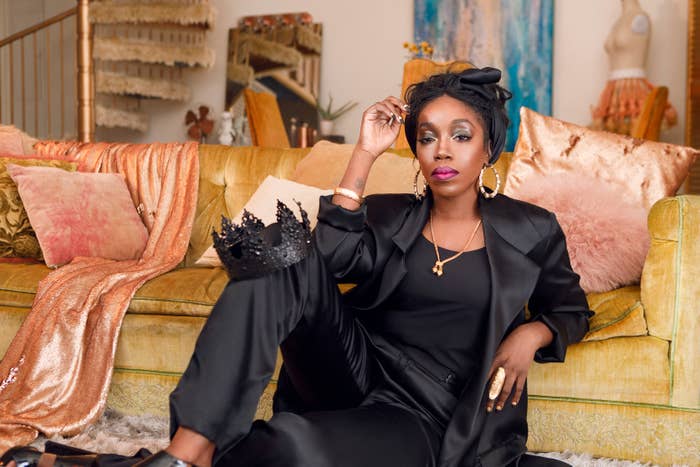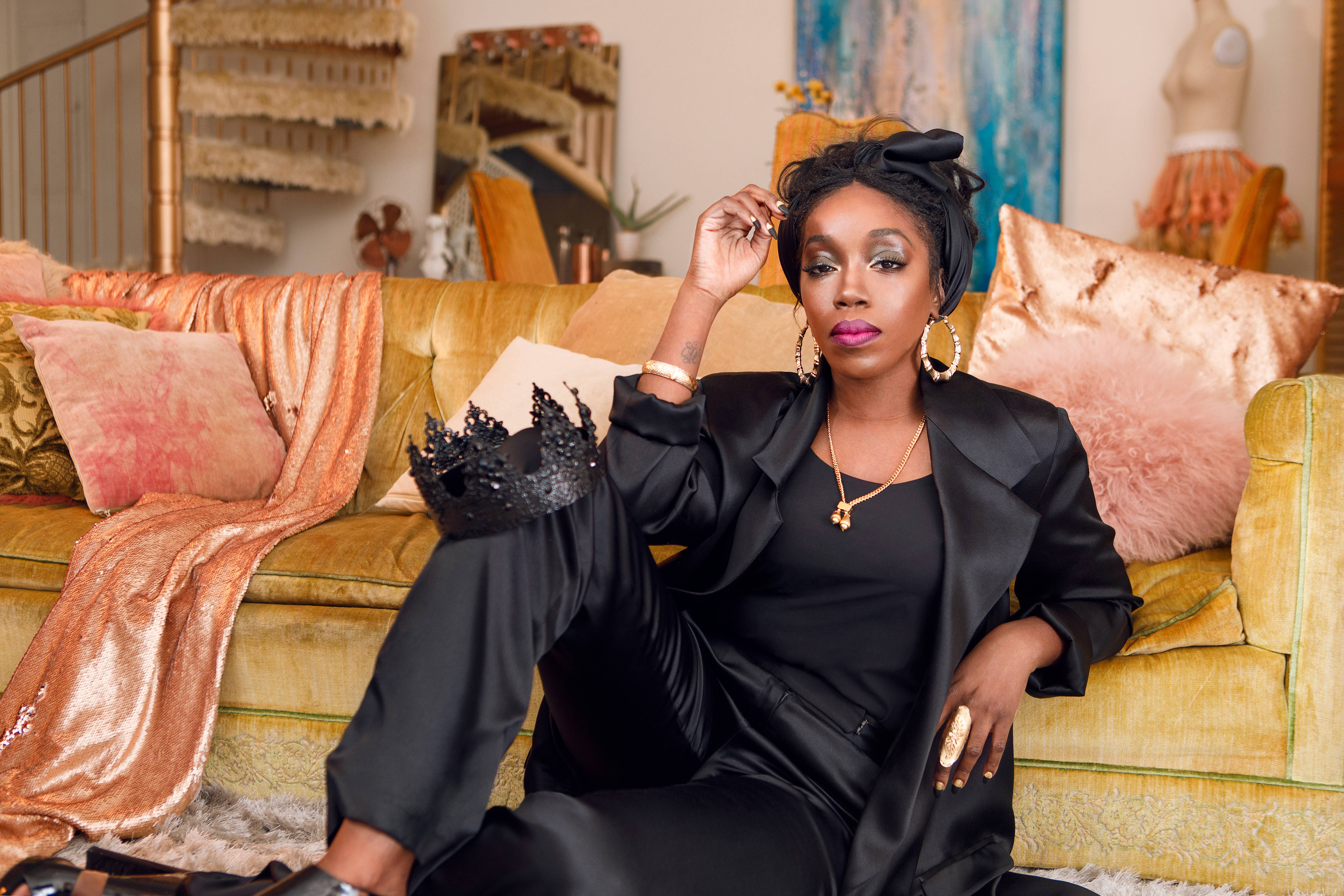
It’s been a while since Estelle was last in her birthplace of London, since setting down roots in LA almost a decade ago. London is still home, but on this visit, she’s staying at The Dorchester hotel, in Mayfair. On the Thursday evening we meet, Estelle is having afternoon tea and champagne.
“Champagne and sweets, this is our best life at all times,” she jokes as the waiters serve the table.
Fourteen years ago, this was unimaginable; Estelle was still living in her mother’s garage. Ten years ago, her life-changing moment came in the form of “American Boy”, her biggest hit to date. The story of “American Boy” began years before its release, but its timeless sound still holds its reverence in pop music. It’s not so dated that it would be sacrilege for a DJ to play it, and because it featured a Kanye West at the apex of his career, the song’s legacy remains strong. Now, in 2018, the contrasts in both artists’ careers couldn’t be more evident.
Estelle has a lot to smile about these days, much of that she credits to her peace of mind and confidence she has in the place she’s currently at in her career. She keeps herself to herself, and as she says, “no one will ever know my business because I’m not out here like that.” For Estelle, the longevity of her career has meant much more than the fame, which can often be elusive for some, and because of that she’s never sought the public’s attention. “I used to have a chef that cooked for me all the time and that felt weird, because I’ve never had people to do things like that for me when I can do it myself,” she says. It also explains why she employs a small team of trusted individuals; it’s a mentality that was planted in the singer, from what Estelle describes as having the opportunity to do something her parents never dreamed of.
For someone who avoids fame, she’s found that navigating the industry can often be like “playing Russian Roulette—putting your shoes on at the same time—and doing it with no clothes on and figuring out how to stay warm,” she jokes; however, being able to tell those stories that matter to her has its gravitas. “I never pigeon-holed myself to just Britain and I’ve toured all over the world, which has always been my goal, so you may not hear my name but I’m always out here.”
In recent years, Estelle’s relationship with her mother has changed a lot. Like most children, she had difficulty redefining an adult relationship that wasn’t necessarily just mother-daughter but one where Estelle could be seen as someone who navigated one of the most tumultuous industries to enter as a black artist. “I was speaking to my mum and dad, asking them why I can’t get this love shit right; I’m out here freestyling with these men and it dawned on me that I was repeating her, only I don’t have kids and didn’t have the same upbringing.” Hence her reasons for staying at a hotel rather than with her mum, who certainly wouldn’t charge almost a month’s rent for a night.
I’m not writing songs for the sake of fame. It’s a nice side effect, but it’s never been the reason why I’ve done this.
It’s still love between the two of them and, in some ways, it’s brought them closer together. Estelle’s mum often says to her, “In order to heal, you have to free the wounds off and let the air get to it. If this helps you get to freedom and where you want to be for the life chosen, just make people like it.” In 2018, Estelle doesn’t have to convince her second-generation parents—of Caribbean and African descent—that the career trajectory she’s on is a fruitful one, although she once had those battles. That can’t be avoided, at least the more positive aspects of it, since she began voicing the character of Garnet on the children’s animation show, Steven Universe, seven years ago. Now there’s a film on the way and children have now become a fixed group within her fanbase, their parents too, showing their love for Estelle recently at Comic-Con. “It wasn’t a path I expected but I learned early on that I didn’t have to follow the traditional route as a black British artist,” she explains. “Technically, it made me realise I have other chambers in my voice as well as being able to extend my brand a bit more, and I never would’ve thought voice-acting would be how this all happened.”
Sure, she looked in an unusual direction for success and has a natural talent for voice-acting, but it turned out to be a favourable move. “We’re in our seventh year of Steven Universe and I’m definitely regarded differently,” she says. “People’s grandparents, kids and parents know me and love the music through Garnet. I can see the broad scope of my career and capabilities now, too.” Before recording her latest album Lovers Rock, she looked backed to Shine, her second album released in 2008 which featured “American Boy”. She didn’t want any of the songs to sound the same as what she’s previously put out.
Granted, not many would be here for a Kanye West feature but it would be difficult to make another “American Boy”, even with the help of a super-producer. But that wasn’t Estelle’s goal with her fourth album. “I hate repeating myself, and when I first started recording Lovers Rock, I realised that a lot of the songs sounded the same as stuff from Shine,” she says. “I do shows pretty frequently, and I know what songs turn people off, so I can’t give them a whole other album of Shine. I’m not writing songs for the sake of fame. It’s a nice side effect, but it’s never been the reason why I’ve done this.” The LP’s opening track, “So Easy” featuring Luke James, certainly embodies the spirit of lover’s rock—a genre widely celebrated among black British people in the ‘70s and ‘80s for its romantic themes against a hostile, racist Britain. It’s the song you want to hear when you’re on the beach with your partner—phones off—while you sip on caipirinhas.
Estelle tells me this is the most personal project she’s released. Lovers Rock, by contrast, takes a look beyond her own love story and looks toward her parents, from whom she’s learned many lessons—such as taking risks and allowing yourself to be more open. In that, Estelle wishes that Lovers Rock provides people with “hope that love is waiting for them.” She adds, “I wanted to give people the idea that you can love, on your own time, and in any way you see fit and that’s all you have to worry about. Just let it be on your own time.”
There is something poetic in Estelle making a lover’s rock album. She tells me it’s an homage to her forebears, in that it channels a similar musical energy that made songs like Janet Kay’s “Silly Games” the timeless hit that it is. But it’s much more than that—especially when you consider the story of her parents who broke up when Estelle was three years old, but reunited twenty years later and then got married. “My parents are now committed to the idea of freedom because they’d lived under the idea that they couldn’t be free in the space of love, or with each other, because of internal, social shit,” she says.
Lovers Rock is as much about self-love as it is romantic—perhaps even more. Estelle was able to see how she was able to achieve that through having that conversation with her parents and then making this album. “There were so many things I had to personally break out of because of what you’ve seen or heard. I did so well and I was out here living my best life but acting like I had six kids in the hood and my decisions reflected that,” she explains. Had Estelle not seen the ways in which she reflected her mum in some ways, she may not have come to realisation and would have likely been stuck on repeat. “[My parents] are happy together and that gives me hope,” she says. “I still thought it was a beautiful love story and it gave people hope, so that’s how this album came to be.”
As Estelle comes to understand herself more, and how generations in her family leave their mark, she still remains as effortlessly cool. Life is something that you never stop trying to figure out and Lovers Rock gave Estelle, above all, the freedom that she truly desired. “I just want people to know I always sang with a smile on my face.”

